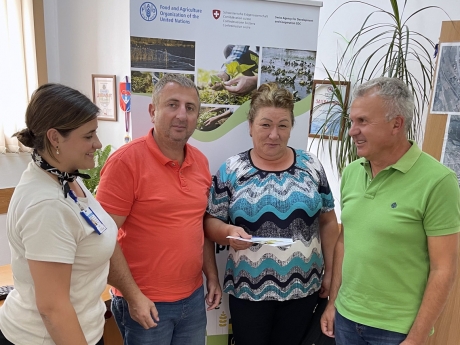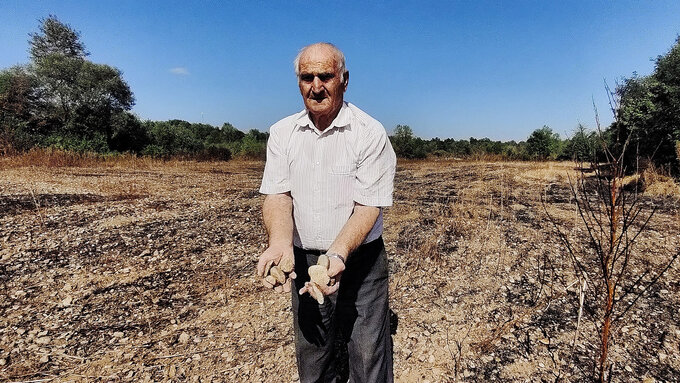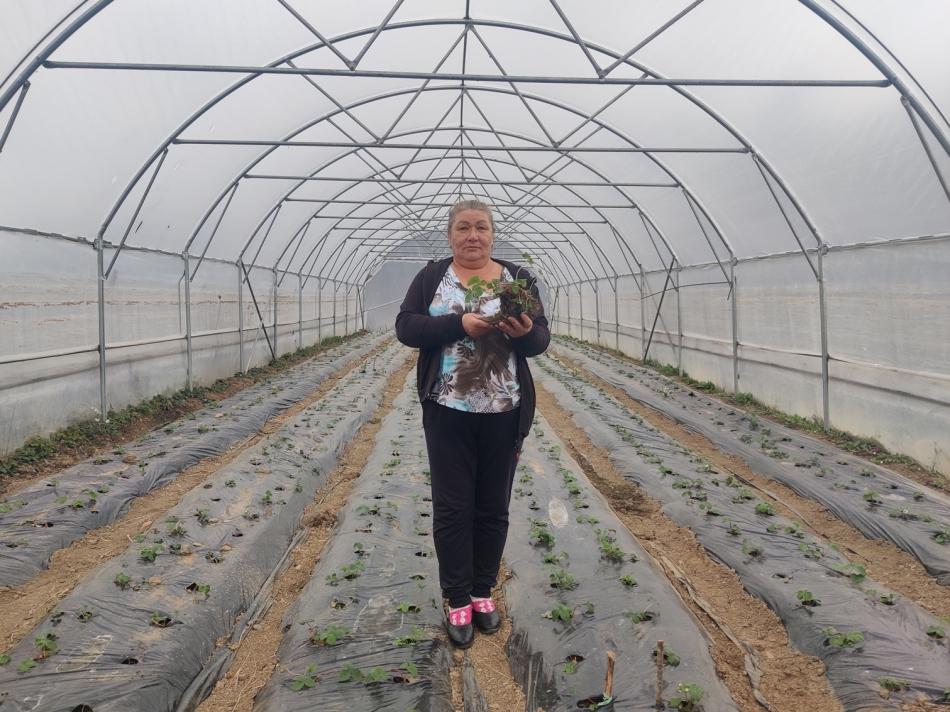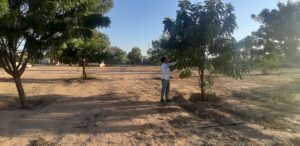
The heavy rains caused many rivers to break their banks, leading to extensive flooding. FAO provided agricultural vouchers to Kosovo farmers so that they could restart their livelihoods. ©FAO
In the agricultural heart of Kosovo, under the radiant sun, stands Pajazit Thaci. At the age of 81, his face bears the traces of seven decades of farming, yet his spirit remains young and vibrant. Pajazit’s presence is felt by all who pass by, his standard white shirt recognizable to all the village. He cares deeply for the land and is always looking forward to the next harvest.
In January 2023, Pajazit faced one of his biggest ordeals as a farmer. In the village of Qiflak in the municipality of Rahovec/Orahovac, located in the southwest part of Kosovo, heavy rains caused the Drin River to burst its banks, resulting in devastating floods that engulfed more than a hectare of his wheat fields.
The aftermath of the floods was even more devastating than the immediate damage. Floodwaters left behind a thick layer of stones and sand on the once-fertile soil, making large swathes of his land unfit for cultivation.
Pajazit didn’t just lose his current crop, he also suffered a grave disruption to his usual annual harvest. In this bout of floods, Pajazit lost the money on which his family would have lived for three months.
Grasping an envelope provided by the Food and Agriculture Organization of the United Nations (FAO), Pajazit knew that the vouchers inside would help to rehabilitate his land and restart his farming.

These vouchers weren’t just about financial support; they’re an acknowledgement of his efforts as a farmer to produce food for himself and his community and his will to continue to do so.
This extensive damage wasn’t solely caused by nature’s power; human activities compounded the problem. For over twenty years, unchecked excavations occurred near the Drin River. Natural barriers of five metres, formed over centuries by the natural river’s flow, were eroded due to continuous sand extraction. This put at risk more than 400 hectares of farmland, including Pajazit and his neighbours’ properties.
Reflecting on earlier times, Pajazit recalls, “I remember when the river was more than 50 metres away from my land. Now, due to unchecked sand excavation, it’s barely 25 metres away.”
Given the state of his land, filled with stones and debris, planting wheat in autumn wasn’t feasible.
“The stones and sand must be cleared before we can begin anew. These very stones are now being used to build a barrier, safeguarding my land from future floods,” Pajazit shared.
Despite the challenges, Pajazit remains resolute to begin farming again. Assisted by his energetic nephew, Sait, they began the arduous task of reclaiming his land, removing the debris by hand. They filled bags with displaced sand and stones, constructing a makeshift wall to stop future flooding. With FAO vouchers aiding him to buy fertilizers and packaging for storage of crops, he’s setting his sights on planting corn, with hopes for a prosperous harvest next season.
In the rolling hill of Leposavsko Polje in the municipality of Leposaviq/Leposavić, in the north of Kosovo, heavy rains caused yet another river to swell and break its banks.
Just last year Živana Petronijević, a 54-year-old widow, had purchased a 2 100 square metre plot in the nearby village Ibarska Slatina, where she built a 150 square metre greenhouse to grow strawberries. However, the January 2023 floods, a result of the swollen Iber River from heavy rain, devastated her greenhouse, leaving her hard work in ruins.

Živana’s spirit remained intact however and, during the late summer and early autumn, she and her 24-year-old son Slavko foraged wild mushrooms and juniper. Their efforts were fruitful, and with the money they earned, they not only reconstructed the greenhouse but also expanded it, thanks in part to FAO vouchers, which they used for fertilizers and irrigation materials. Investing in two more greenhouses, they resumed their strawberry cultivation, determined to recover their losses.
Despite the absence of sophisticated machinery, Živana and Slavko work tirelessly, nurturing their land and flock of more than 60 chickens. “I’m active every day, but during January and February, when my work slows, I feel aches all over,” Živana remarks with a smile, her eyes shining with life and motivation. “It’s when I’m working the land that I don’t notice any pain.”
With her warm personality and welcoming nature, combined with her unwavering dedication to her farm, she has been a symbol of strength for her community.
For both Pajazit and Živana, the floods were a reminder of nature’s dual force: one that can both nourish and devastate. Živana is now focusing her efforts on expanding her farm while investing for the future. With the assistance of FAO vouchers for restarting their livelihoods, both farmers are more hopeful about a prosperous tomorrow.
In total, over 900 farming households in nine municipalities had their land and assets damaged by the floods. FAO was able to provide agricultural assistance through vouchers thanks to funding from the Swiss Development Corporation. In Kosovo, 98 per cent of farming households do so for subsistence, meaning the floods also had a direct impact on their food security.
Floods are a recurrent issue here. Ones with a similar magnitude occurred in June 2008, December 2010, March 2013, November 2016 and June 2019 and all have been caused by heavy rainfall.
FAO is building the capacity of local authorities for emergency response preparedness and post-disaster damage and loss assessments. At the same time, when disasters or crises hit, vouchers allow farmers to choose from local suppliers the agricultural inputs they most need to restart their livelihoods and bounce back quickly.
Source: the FAO News and Media office, Rome
– global bihari bureau





